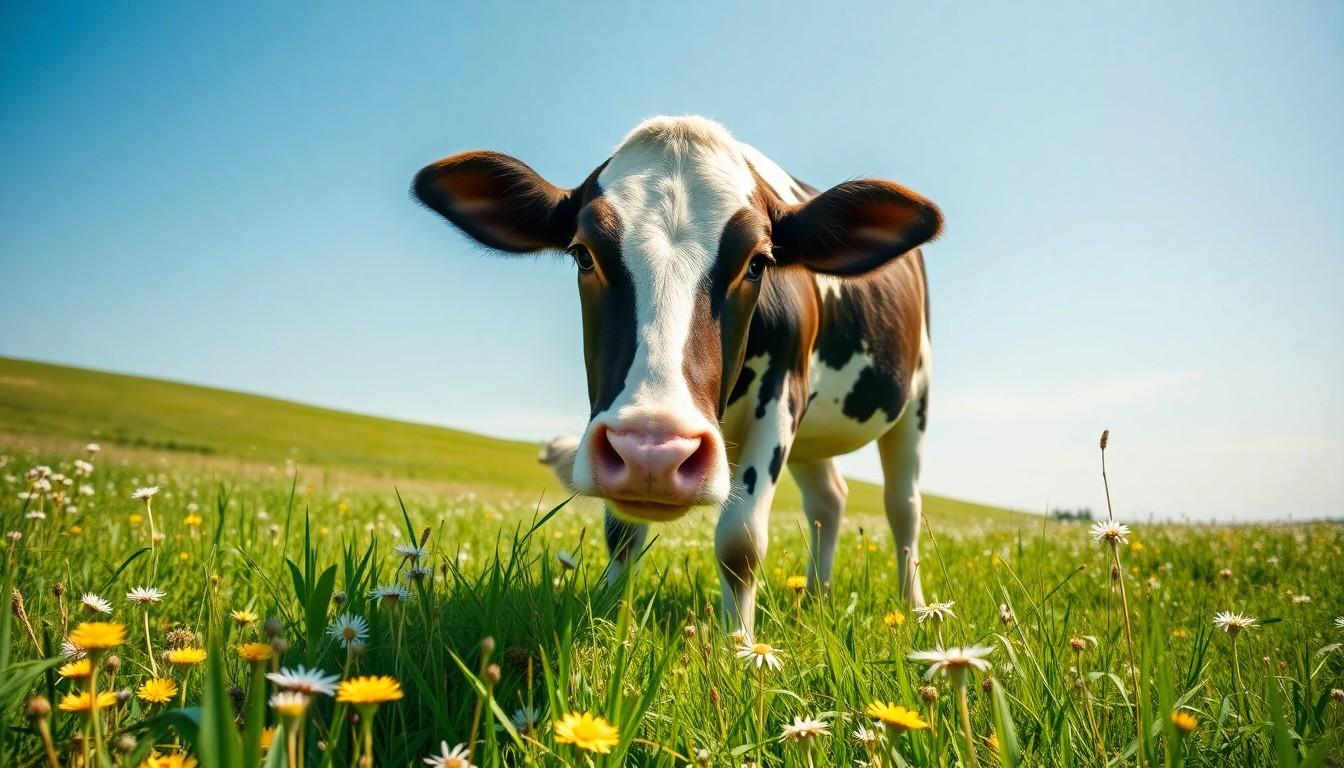Imagine a world where cows graze happily on lush green pastures, mooing in harmony with nature. Welcome to organic dairy farming, where the grass is always greener, and the milk is as pure as a mountain spring. This isn’t just a trend; it’s a movement that’s reshaping how we think about our food and the environment.
Organic Dairy Farming
Organic dairy farming emphasizes sustainable practices that align with natural ecosystems. This farming method prohibits the use of synthetic fertilizers, pesticides, and genetically modified organisms. Organic dairy farmers rely on wholesome feed and maintain high animal welfare standards.
Cows typically graze on pasture at least 120 days per year, ensuring they access fresh grass. Rotational grazing enhances soil health and minimizes erosion, promoting a robust ecosystem. Nutrient cycling through animals’ manure fosters a self-sustaining system that improves soil quality.
The organic certification process involves rigorous standards and inspections. Certification ensures transparency and traceability from the farm to consumers. Products labeled as organic meet criteria set by the USDA, guaranteeing they come from farms dedicated to organic principles.
Economic benefits often accompany organic dairy farming. Organic dairy products fetch higher prices in the market. Demand for organic milk and cheese continues to rise among health-conscious consumers, contributing to the sector’s growth.
Organic dairy farming also plays a role in carbon footprint reduction. Product sourcing from local organic farms helps decrease transportation emissions. These practices promote biodiversity, benefiting the planet and society alike.
Organic dairy farming represents a viable approach to sustainable agriculture. The commitment to ecological integrity, animal welfare, and consumer health shapes its future. The combination of these factors enhances the appeal of organic dairy products in today’s market.
Benefits of Organic Dairy Farming

Organic dairy farming provides a range of substantial benefits that enhance health, environmental sustainability, and economic viability.
Health Benefits
Organic dairy products offer nutritional advantages. They often contain higher levels of omega-3 fatty acids and antioxidants compared to conventional products. Studies indicate that consumers experience fewer exposure risks to harmful chemicals when choosing organic. Dairy from organic farms also lacks synthetic additives, promoting better overall health. Additionally, these products may improve digestion due to probiotic-rich options available in the organic sector. Higher animal welfare standards correlate with improved milk quality, resulting in healthier products for consumers.
Environmental Impact
Organic dairy farming promotes sustainable land use practices. By utilizing rotational grazing, farms improve soil health and enhance biodiversity. Studies show that this practice reduces erosion and increases water retention in soils. Carbon footprints decrease significantly as organic farms avoid synthetic fertilizers and pesticides. Ecosystem balance benefits from increased flora and fauna diversity. Additionally, organic farming contributes to the local economy by preserving rural landscapes and promoting community resilience through sustainable agricultural practices.
Challenges in Organic Dairy Farming
Organic dairy farming faces specific challenges that can impact its sustainability and profitability. Farmers often encounter obstacles related to pest management and certification processes.
Pest Management
Managing pests organically presents unique difficulties. Organic guidelines restrict the use of synthetic pesticides, forcing farmers to adopt alternative methods. These methods include cultural practices such as crop rotation and the use of natural predators. Additionally, integrated pest management (IPM) strategies help minimize pest populations without harmful chemicals. Challenges arise when pests become resistant to organic methods, leading to potential crop loss. Developing effective pest control plans requires ongoing education and adaptability, ensuring practices align with organic standards.
Certification Processes
The certification process for organic dairy farming is a rigorous journey. Farmers must adhere to USDA guidelines that promote transparency and accountability. Gaining organic certification takes at least three years of maintaining organic practices. During this period, farmers surrender conventional practices and prove soil health and ecosystem management. Maintaining documentation is crucial, as it demonstrates compliance with organic regulations. Challenges often include navigating paperwork, record-keeping, and meeting annual inspections, which can strain resources. Successfully achieving certification guarantees organic products meet consumer expectations and enhance market value.
Best Practices in Organic Dairy Farming
Organic dairy farming emphasizes a harmonious relationship between animal welfare and sustainable practices. Implementing best practices maximizes productivity while caring for the environment.
Animal Welfare
Prioritizing animal welfare remains central to organic dairy farming. Cows must graze on pasture for at least 120 days each year. Ensuring ample space supports their natural behaviors and improves overall health. High animal welfare standards prevent stress and promote better milk quality. Healthier cows yield higher levels of omega-3 fatty acids and antioxidants in their milk. Regular veterinary care supports illness prevention and maintenance of good health. Managing herd size effectively allows for better individual attention to each animal.
Sustainable Practices
Incorporating sustainable practices sustains both the environment and farming efficiency. Farmers often utilize rotational grazing to enhance soil health, reduce erosion, and improve water retention. Resilient ecosystems thrive when natural pest management strategies, like crop rotation and beneficial insects, replace synthetic pesticides. Cover crops protect soil during off-seasons, improve fertility, and prevent erosion. Using organic fertilizers enriches soil without harming its ecological balance. Consequently, these practices contribute to lower greenhouse gas emissions. Adopting these methods creates a resilient and productive organic dairy farming system.
sustainable agriculture
Organic dairy farming represents a vital shift towards sustainable agriculture that benefits both the environment and consumer health. By adhering to strict practices that prioritize animal welfare and soil health, farmers contribute to a more resilient ecosystem. The growing demand for organic dairy products highlights the importance of transparency and quality in food production.
Despite the challenges faced, such as pest management and certification processes, the commitment to organic principles fosters innovation and community support. As consumers increasingly seek healthier and environmentally friendly options, organic dairy farming stands as a promising avenue for future agricultural practices. Embracing these methods not only nurtures the land but also enriches the lives of those who engage with it.

